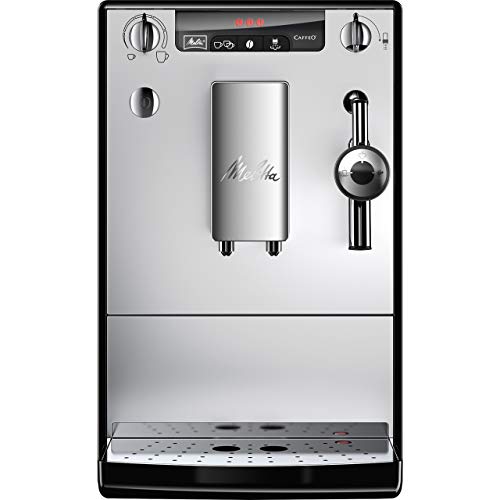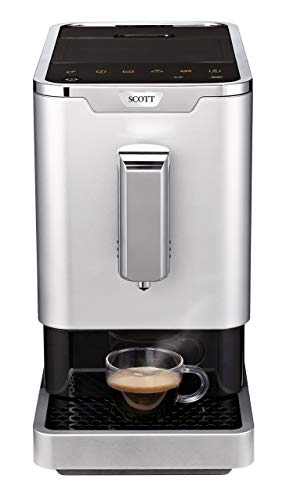20 Tips To Help You Be More Successful At Bean Coffee Machine
페이지 정보

본문
 Coffee Bean Coffee Machines
Coffee Bean Coffee MachinesIf you purchase a coffee bean machine, you can take pleasure in fresh, delicious whole-bean coffee made to your exact specifications. The machine grinds beans, measures them, then tamps and pushes hot water through the grounds to create rich, flavourful coffee.
They have a number of advantages over pod machines, including less environmental waste and a simple to use. The machine is fully automatic and can be operated with just a single button.
The following are some alternatives to the word "grind"
The kind of grind you choose is crucial to a great cup of coffee. The size of the particle is vital in addition to its shape and consistency. If you do not grind beans correctly, the water will move through the grind too fast. This could result in a bitter taste or a lack of flavor.
A good grinder will have various sizes of grind to allow you to choose different brewing methods. It is important to experiment with different sizes of grinds, since they can greatly affect the flavor of your brew. The smallest size is ideal for espresso and French presses, while larger, coarser ones are best for brewing in an immersion, such as with the Moka pot or Chemex.
Try roasting your beans and grinding them before brewing to make a delicious cup of coffee. This will enhance the taste and aroma and create an excellent cup of coffee each time. It is also essential to store the ground beans in an airtight container a cool, dark place to preserve their freshness and flavor.
Commercial machines that make coffee provide unbeatable convenience. They let you enjoy barista-quality coffee with the click of a button. These machines handle everything from preparing the beans to tamping, making them an ideal choice for busy cafes and offices.
They begin by grinding your choice of beans to a precise grind size. They can be adjusted to match the specific brewing method you prefer, and can be set to dispense the appropriate amount of cups or shots simultaneously. Certain machines automatically compact the grounds to ensure the most efficient extraction.
A bean-to-cup machine usually comes with a large hopper you can fill with whole beans. The machine will automatically grind the beans and dispensing the proper amount for the brew you choose. The display on these machines will show the beans used and the size of grind you have selected. It will also show the total amount of drinks the machine is preparing.
Extraction
When the coffee bean is ground it breaks up into smaller pieces called particles. The size of the particles could affect the extraction process as well as the final cup's taste. In the machine that brews coffee, the size of the coffee particles is controlled so it matches the extraction method required by the machine. This lets you make a great cup of coffee every time and does not require the skills of a barista.
The brew duration in a bean to cup machine can be controlled to achieve precisely the strength you desire to drink. This is a huge advantage over pod machines, which typically provide less control and could result in weaker or more bitter tasting coffee. Bean-to-cup machines let you regulate not just the brew-time as well as the water temperature. This lets you decide how strong your coffee will be.
Extraction is an extremely delicate process that is dependent on the right balance of particle size, dose and pressure. If any of these elements are off it can result in a poor extracted coffee. Coffee that isn't extracted enough will taste sharp and sour and coffee that is extracted too much will taste dry and bitter.
To ensure that your coffee is extracted correctly, you need to use a high-quality grinder and the appropriate type of beans. Light roasts are often not the best choice for fully automated or espresso machines, since the short extraction process can leave the coffee dry and lacking in body. More dark roasts that have high Robusta content, like our Jhai (100 percent Robusta) or Tiga Terra, are better for these types of machines, as they provide richer flavors and stronger bodies.
The final decision between a bean-to cup machine and pod coffee machines comes down to personal preference and convenience. Pod coffee machines offer an easy method to make tea and coffee, however they tend to be less cost-effective than a bean to cup espressomaschine-to-cup device and can produce significant waste as a result of the disposal of used pods.
Dispensing
If you use whole beans you will save money and enjoy more flexibility. However this also means your machine will require more frequent maintenance and cleaning than a pod-based model.
These machines are designed to be low-maintenance and include numerous features that make the task easier. The majority of Bean to cup espresso machine-to-cup coffee makers come with automatic bean to cup coffee machines cleaning and rinsing cycles. This makes it easy to maintain your machine without disrupting your daily routine.
Another useful feature is the ability to add steaming hot milk to coffee beverages. This lets your team modify their drinks to their preferences and tastes while boosting productivity. It's also a good way to show that you care for your team's well-being. In fact, it has been proven scientifically that coffee can boost dopamine and norepinephrine levels, which boosts motivation and focus in the workplace.
Some models even offer additional beverage customization options, such as the ability to texturize milk for cappuccinos as well as lattes. This is a major feature for baristas who may only have a short amount of time to prepare each cup of coffee.
Another thing to look out for in a high-quality bean-to-cup coffee maker is the water tank and the size of the bean hopper. The water tank determines the length of time the machine can run before it must be replenished and the size of the hopper affects the frequency with which you'll have to replenish the beans. In general, the larger capacity of each tank, the less often you'll have to replenish.
Before you purchase a bean-to-cup coffee maker, you should be aware of the type of beans you'll be using since different grind sizes affect the best bean to cup coffee machines flavor and consistency of each cup. In addition, you must look into the machine's settings that can be programmed that let users tweak aspects of their drinks to create their ideal beverage every time.
In some cases, the dispensing spouts of your coffee bean to cup maschine machine may get blocked by ground coffee residue and other debris that is left after grinding. The spouts must be cleaned frequently to prevent slow and inconsistent flow, which could result in insufficient dosing of grounds of coffee. This could be caused by too coarse a grinding setting, overly dry or oily beans, or an absence of regular cleaning and rinsing.
Cleaning
Cleaning coffee machines is an essential aspect of running a machine in order to avoid the accumulation of residues that can negatively affect the quality and taste of drinks. Regular cleaning ensures that the machine is in good condition and decreases the likelihood of a malfunction that could lead to costly repairs. Many bean-to-cup coffee machines will include a daily cleaning cycle which will flush out pipes and clean the brewing unit while others will have separate milk side cleaning process to ensure that the spouts are cleaned thoroughly.
During installation, a good rental company will instruct their staff on how to maintain and clean the equipment. This will help reduce confusion and ensure that the steps are correctly followed. With clear instructions and a complete understanding of the process can assist in avoiding any mistakes that could result in costly repairs or low-quality drinks.
After each use, it is best to clean your carafe and permanent filter with soapy water, or in the dishwasher, if the item is marked as safe. It is also a good idea to run two to three cycles of fresh cup espresso water without K cups or ground coffee in the machine between use. This will help get rid of any oily residue, and will stop the growth of mould, bacteria or yeast.
It is a good idea for single-serve coffee makers or pod coffee makers to conduct a thorough cleaning and descale every four weeks. A vinegar solution is usually used to do this. Add up to four cups of vinegar to the reservoir and run the machine through a brewing cycle. After the cycle is completed, rinse and descale according to manufacturer's instructions. Perform several cycles of clean water in order to remove any vinegar odor.
Commercial machines have a built-in the telemetry system, which records each cleaning cycle. Your supplier or you can check this to make sure that the machine is cleaned regularly. This could also alert you to whether any of the moving parts have become stuck or jammed that require more thorough maintenance and repair work.

- 이전글12 Companies Are Leading The Way In Coffee Machine For Coffee Beans 24.11.24
- 다음글The 10 Scariest Things About Coffee Beans Coffee Machine 24.11.24
댓글목록
등록된 댓글이 없습니다.